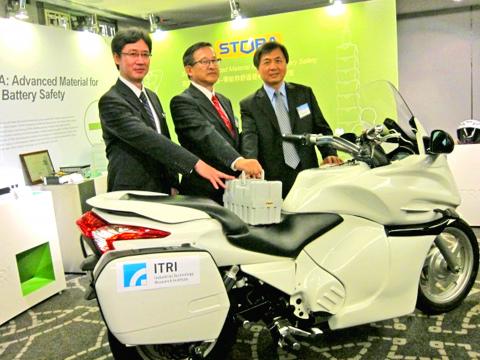The Industrial Technology Research Institute (ITRI, 工研院) yesterday signed a NT$100 million (US$3.28 million) technology licensing agreement with Taiwan Mitsui Chemicals Inc (亞太三井化學) to produce safer lithium-ion batteries.
Taiwan Mitsui Chemicals Inc is a fully owned subsidiary of chemicals producer Mitsui Chemicals Inc.
Japan-based Mitsui Chemicals plans to build a production site in Taiwan by the end of 2016 to manufacture materials for lithium-ion batteries using the institute’s self-terminated oligomers with hyper-branched architecture (STOBA) technology to prevent explosions, Mitsui Chemicals managing executive officer Shigeru Isayama told a news conference.

Photo: Hung Yu-fang, Taipei Times
“We will establish close relationships with Taiwanese companies related to lithium-ion batteries,” he said.
Isayama said the company is further studying the market for lithium-ion batteries worldwide, and may build more production sites in other countries if needed.
Mitsui Chemicals expects STOBA batteries to account for 10 percent of total shipments of lithium-ion batteries around the world by 2020, said Akio Hirahara, general manager of the company’s new market development division.
Citing Fuji Keizai, a Japan-based information provider, Mitsui Chemicals said the market for lithium-ion batteries would increase to 80 gigawatt hours in 2020 from an estimated 40 gigawatt hours this year.
Mitsui Chemicals said it plans to use the new technology to make materials for batteries used in cellphones, personal computers and cars.
“Compared with local chemical companies, Mitsui Chemicals has stronger ties with car makers, which can help promote STOBA technology in the car industry,” said Pan Jing-pin (潘金平), a division director at the institute.
Pan said Mitsui Chemicals’ electrolytic solution is used in batteries for Boeing 787 and electric vehicles developed by Nissan Motor Co.
Mitsui Chemicals is also the largest producer of polypropylene compounds around the world, with Toyota Motor Corp and Honda Motor Co its two major clients, the company said.
STOBA materials can form films in lithium-ion batteries to stop the chemical reaction and terminate the batteries safely when the batteries’ internal temperature rise to abnormal levels, the institute said, adding that STOBA batteries last twice as long as than other lithium-ion batteries.
The technology won the R&D 100 Awards in Energy Devices in 2009, the institute said, adding that STOBA batteries manufactured by Amita Technologies Inc (有量科技) are now used in China Motor Corp’s (中華汽車) E-moving 100 electric scooters.
In addition to Amita Technologies, the institute licensed the technology for manufacturing STOBA batteries to three other Taiwanese lithium battery makers — E-One Moli Energy Corp (能元科技), Lion Tech Co (精極科技) and Synergy ScienTech Corp (興能高科技) — last year, it said.

The US dollar was trading at NT$29.7 at 10am today on the Taipei Foreign Exchange, as the New Taiwan dollar gained NT$1.364 from the previous close last week. The NT dollar continued to rise today, after surging 3.07 percent on Friday. After opening at NT$30.91, the NT dollar gained more than NT$1 in just 15 minutes, briefly passing the NT$30 mark. Before the US Department of the Treasury's semi-annual currency report came out, expectations that the NT dollar would keep rising were already building. The NT dollar on Friday closed at NT$31.064, up by NT$0.953 — a 3.07 percent single-day gain. Today,

‘SHORT TERM’: The local currency would likely remain strong in the near term, driven by anticipated US trade pressure, capital inflows and expectations of a US Fed rate cut The US dollar is expected to fall below NT$30 in the near term, as traders anticipate increased pressure from Washington for Taiwan to allow the New Taiwan dollar to appreciate, Cathay United Bank (國泰世華銀行) chief economist Lin Chi-chao (林啟超) said. Following a sharp drop in the greenback against the NT dollar on Friday, Lin told the Central News Agency that the local currency is likely to remain strong in the short term, driven in part by market psychology surrounding anticipated US policy pressure. On Friday, the US dollar fell NT$0.953, or 3.07 percent, closing at NT$31.064 — its lowest level since Jan.

The New Taiwan dollar and Taiwanese stocks surged on signs that trade tensions between the world’s top two economies might start easing and as US tech earnings boosted the outlook of the nation’s semiconductor exports. The NT dollar strengthened as much as 3.8 percent versus the US dollar to 30.815, the biggest intraday gain since January 2011, closing at NT$31.064. The benchmark TAIEX jumped 2.73 percent to outperform the region’s equity gauges. Outlook for global trade improved after China said it is assessing possible trade talks with the US, providing a boost for the nation’s currency and shares. As the NT dollar

The Financial Supervisory Commission (FSC) yesterday met with some of the nation’s largest insurance companies as a skyrocketing New Taiwan dollar piles pressure on their hundreds of billions of dollars in US bond investments. The commission has asked some life insurance firms, among the biggest Asian holders of US debt, to discuss how the rapidly strengthening NT dollar has impacted their operations, people familiar with the matter said. The meeting took place as the NT dollar jumped as much as 5 percent yesterday, its biggest intraday gain in more than three decades. The local currency surged as exporters rushed to